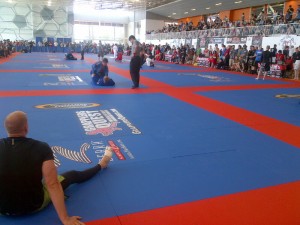Detecting and Preventing Heat Related Emergencies
Summer is here and we all know what that means, increased exposure to high temperatures and humidity. Have you ever noticed how much your appetite decreases, your body fatigues and headaches pursue after a few hours in the sun? This is probably because you haven’t been taking the preventative measures to keep yourself hydrated. In order to keep hydrated you must consume water before, during and after exercise, especially when outdoors. Total body sweat loss up to 2% can account for a substantial 15-20% performance decrease! We must ensure an adequate intake of natural electrolyte sources as well as water to maintain healthy sugar levels for the body. This in turn, helps the body maintain proper fluid balance and muscle functioning. Excellent sources include coconut water, bananas, tomatoes and many other fruits and leafy greens. Eating a proper diet, consisting of decreased fat intake, and an increased fruit and vegetable consumption, will help promote fun in the sun.
Other important factors to abide by, when exercising in the sun:
- TAKE FREQUENT BREAKS! Allow your body the proper cool down time in between exercise intervals to maintain a healthy core temperature
- Wear light coloured, loose fitted clothing
- Ensure shady or indoor areas where cooler temperatures can be found
- Learn if you may be pre-disposed to heat related emergencies by taking a look at your family history and talking to your family physician
- If possible wear water repellent synthetic gear
- Avoid alcohol consumption, as it further dehydrates your body!
- Apply an SPF of at least 30 before exposure to sun, and reapply after excessive sweating or swimming
- HYDRATE, HYDRATE, HYDRATE! If taking part in outdoor activities lasting longer than 1 hour try drinking drinks consisting of half water and half electrolytes (i.e. half Gatorade, half water)
- EXTRA CAUTION: young children, the elderly and anyone with high blood pressure or any mental or physical illnesses needs to take extra precautions when out in the heat.
So with these tips in mind, go out and continue to have fun in the sun!
Listen to Your Body!
Listen to your body. It sounds like an odd request doesn’t it? You’re probably wondering “What exactly am I listening for?”
Here are a few common examples:
- Pain
- Fatigue/Insomnia
- Anxiety/Stress
- High blood pressure/High cholesterol
- Eczema/Allergies
- Digestive issues/Bloating
These are all your body’s attempt to:
1) Tell you something is wrong internally;
2) Motivate you to make health and lifestyle changes to improve it.
To help you pay better attention to your body, try writing your symptoms down. Start with tracking:
- When did my symptoms start?
- What makes it better or worse? For example, certain food, stress, and various activities can improve or worsen all of the above symptoms.
Listening to what your body is trying to tell you, through your symptoms, is the first step to helping you get your health on the right track. The second step is seeking the guidance of a qualified health care professional who can assess and treat not only your symptoms, but the underlying causes of your health conditions, in order to support life-long health.
Naturopathic medicine is a proactive approach to health care that can improve many health conditions including the ones listed above, by integrating:
- Comprehensive Naturopathic Assessment
- Clinical Nutrition Counselling
- Acupuncture and Chinese Medicine
- Lifestyle Counselling
- Herbal Medicine
- Homeopathy
Dr. Odette Bulaong, ND is offering COMPLIMENTARY 15 minute naturopathic consultations so you can learn how naturopathic medicine can help you achieve your goals in health and life.
Developing posture and locomotion the right way
Ever wonder why babies develop their posture and motor milestones in the same way at about the same time? Pediatricians use these milestones to determine if a baby is developing at an appropriate pace or if they are developmentally immature. A baby spends time at different postural stages (i.e. on their stomach, chest on all fours, etc.) until he/she is ready to progress. Nobody needs to cue or tell the baby what to do. They will sense, feel and develop the motor control necessary to move to the next step. This neurological program for us to develop posture and locomotion is a part of all of us…
Read Full June Health Talk Article on Posture and Locomotion

